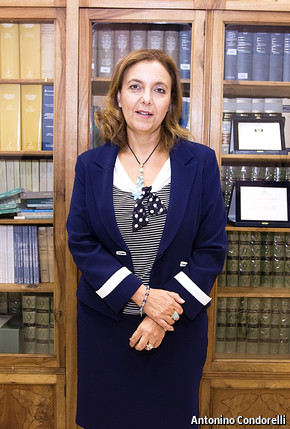Organised crime in Italy
Brave mayors lose heart in the battle against the mob

Elisabetta Tripodi: last woman standing
ASK Elisabetta Tripodi if she is starting to feel lonely, and she replies, “A little.” Ms Tripodi is mayor of Rosarno, one of Italy’s most mafia-ridden towns. She was one of three female local-authority chiefs in the southern region of Calabria who won nationwide attention for their courage in defying the ’Ndrangheta, an organised-crime group that began locally and spread internationally. (It controls much of the transatlantic cocaine trade.)
The most serious threat to Ms Tripodi was subtler. Six months after taking office, she received a letter from a jailed ’Ndrangheta “godfather” complaining she had evicted his mother from an illegally built house. Chillingly, it was written on council stationery. She has lived ever since under police guard. At a meeting with the three women last month, Laura Boldrini, speaker of the Chamber of Deputies in Rome, said: “You wanted and want to do normal things. But in certain areas what is normal is considered extraordinary—so extraordinary as to be perceived as unacceptable.” Ms Tripodi, who is halfway through her mandate, says: “I consider it an achievement to have got this far. Everyone was ready to bet I’d give up after six months.”
The experience of these mayors has been typical of individuals and groups who take a stand against organised crime in Italy: three steps forward, followed by two back. But it shows that popular resistance to organised crime is growing. Until recently, this resistance was largely confined to Sicily. One of the first initiatives there was Addio Pizzo, an association founded in Palermo by four young people who wanted to run a bar without funding Cosa Nostra (the movement takes its name from pizzo, the slang word for an extorted payment). Its website has a searchable directory of its member organisations: shops, bars and restaurants whose owners refuse to pay up and shut up. That is easier said than done on an island where an estimated 70% of commercial establishments hand over a proportion of their earnings to the Mafia.
One that does not is the Antica Focacceria di San Francesco, which sells traditional Sicilian street food in eight Italian cities and at Fiumicino airport, near Rome. It began its expansion to offset losses it suffered in Palermo after its owners, the Conticello brothers, fingered the mobsters who had tried to extort them. They allied with Feltrinelli, a publishing house with left-wing roots which hosts the bakery’s outlets in many of its bookshops. Feltrinelli now owns 95% of the company and in January took a majority holding in the original Focacceria in Palermo. “We tried to hold out, for sentimental as well as economic reasons,” said Vincenzo Conticello. “But the recession forced our hand, along with the threats from the Mafia.”
Nessun commento:
Posta un commento